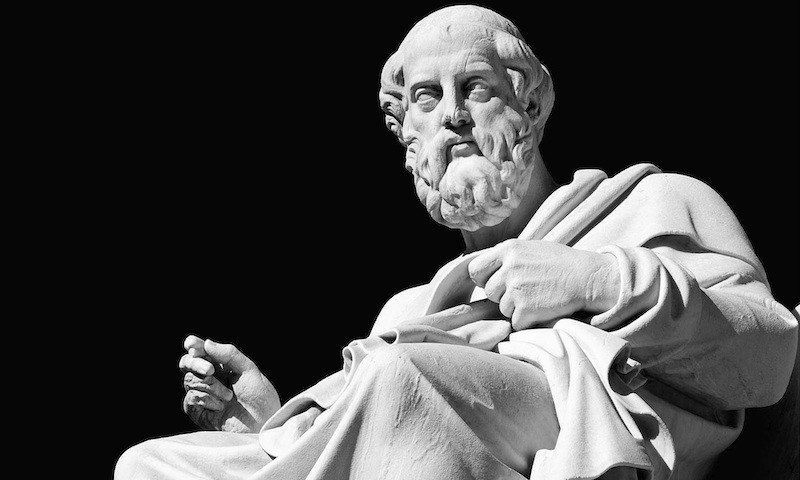Plato posits that the Greek concept of politeia – broadly defined as social harmony – is the core virtue which each citizen must aspire towards for society to become harmonious. This sense of harmony must exist within each person, and emanates outwards to society, thus creating the beautiful city. This harmonious, beautiful city, Plato termed Kallipolis.
However, there is a catch-twenty-two. Plato does not believe ordinary people capable of achieving the level of internal harmony necessary to establish the Kallipolis. Only those capable of harnessing rational thought in a temperate, wise manner, are fit to develop or lead the beautiful city.
…the greatest number of desires and pleasures and pains is generally to be found in… the less respectable majority of so-called free men…
…the simple and moderate desires, guided by reason and right judgement and reflection, are to be found in a minority who have the best natural gifts and best education.
This feature too you can see in our state, where the desires of the less respectable majority are controlled by the desires and the wisdom of the superior minority.
Plato Republic. 431c-431e
This runs counter to modern western democratic ideals. Indeed, Plato views democratic society as a lesser, imperfect form of governance. For Plato, the Kallipolis represents the pinnacle of societal governance, because it represents rule by reason, wisdom, and justice.
Plato asserts four other, lesser forms of social regime, which are:
- Timocracy – rule by a military class with honour as its guiding principle.
- Democracy – rule by elected officials voted by the people.
- Oligarchy – authoritarian rule by a small group of people.
- Tyranny – authoritarian rule by a single person.
According to Plato, our democratic system is flawed in that it encourages rule by leaders who may not necessarily be fit to rule, both in terms of ability and of motive.
In the modern world, we often see this to be the case. Our elected leaders rarely make it their life-long trade to actually lead a nation. They come from other fields – law, business, politics – but never do we see an elected leader emerge from the field of ‘ruler-in-training’.
One is reminded of the film ‘300’ when King Leonidas asks the Athenians, one by one, what their trade is. One says he is a farmer. Another says he is a hunter. Leonidas then turns to the Spartan soldiers, and asks what their profession is. In a single, unified voice, they declare that they are soldiers.
If is not the life-long profession of a ruler to rule – if democracy merely thrusts a person into the role of ruler based on popularity – how is it possible for democracy to produce truly effective rulers?
…a man cannot play many parts as well as he can one.
Plato Republic. 394e
On the question of motive, the nature of democracy is such that those who desire power would seek it out. The democratic process encourages participation by those who wish to have control over other people. Is it not inevitable, then, that those closer to the top of the hierarchy, as produced by the democratic process, are more likely to enjoy their power over the people and more likely to compromise on positions of justice to maintain popularity in order to stay in power?
And isn’t it likely that those who seek out power, those who find pleasure in power, would, if given the chance to wield unlimited power, wield it to the full extent possible, and resist letting that power go?
Power, after all, is intoxicating. Karl Marx called religion the opium of the people. If religion is the opium of the people, power is the stimulant of their rulers.
Here then, is the danger of the democratic process.
Imagine what the outcome would be if, by some chain of events, society finds itself electing an unqualified, vastly popular ruler, who, drunk on his own power, refuses to relinquish that power, and instead uses that power to further his own agenda.
One word. Tyranny.
We have only to look to recent history to see clear examples of this.
Let us assume for a moment that Plato is correct, and that democracy is indeed a lesser form of governance compared to the Kallipolis. What then, makes the Kallipolis superior to democracy?
To keep things simple, let us focus on one aspect – leadership. Plato has already established that ordinary people are incapable of developing the internal harmony and constitution – the internal politeia – necessary to establish an outwardly harmonious society. Ordinary people, therefore, require leadership.
What should this leadership look like, and how should these leaders be selected?
For Plato, the leaders should be dedicated to leadership. They should be philosophers – thinkers – whose sole purpose is to think about how best to provide justice to the people and to society. Thus arises the title the Philosopher King. It is the Philosopher King who is best fit to lead, for he is best able to think in rational terms, and his wise internal constitution is reflected by the beauty of the Kallipolis.
Would you agree then that our prospective Guardian needs, in addition to his high spirits, the disposition of a philosopher?
Plato Republic. 375e
More importantly, the Philosopher King is a reluctant ruler. He does not seek power. Indeed, he wishes to avoid power. Furthermore, the position of ruler must be an austere one. He may accrue no wealth of his own, may have no family of his own, and may own only enough property necessary for survival.
In this way, the decisions of the Philosopher King are not coloured by personal motivation. Nor are his decisions coloured by fear, or by the quest for popularity, because he is unelected, and in little danger of being ousted.
By contrast, the populace whom the Philosopher King presides over, may enjoy all of the benefits of wealth, property ownership, family, and freedom.
On the face of it, Plato’s proposition appears to be a worthy one. Yet we must ask ourselves why Plato appears to disregard the fundamental aspects of human nature as they apply to philosophers, whilst at the same time appealing to the flaws of human nature as they apply to ordinary people.
This contradiction is difficult to reconcile.
On the one hand Plato shows little faith in human nature, and does not think that ordinary people are capable of achieving the level of wisdom and harmony necessary to create the Kallipolis.
On the other hand Plato shows great faith in human nature, given that he ascribes philosophers, and only philosophers, the ability to develop a harmonious internal constitution.
He ignores the idea that power itself is a corrupting vector. For all of his austerity, for all of his initial lack of desire for power, the fact that the power of the Philosopher King is unquestionable and complete, lends itself to the possibility that the governance style of the Kallipolis may too descend into oligarchy or tyranny. Philosophers are human as well. Given that power is the stimulant of rulers, is it not reasonable to suppose that even the most reluctant, enlightened ruler may, at some point, find himself drunk on power?
The feasibility of the Kallipolis rests upon two pillars: institutional entrenchment, and personal disposition. Are these two pillars enough to bypass the hunger for power ingrained into the human psyche?
We must always be wary of idealized forms of governance. Ideology, even as espoused by great philosophers like Plato, often yields horrifying results. Why? Because ideology denies human nature. Idealized forms of governance seek to mould the human into the model of governance, rather than the other way round. Plato’s Kallipolis seeks to do the same. It seeks to deny human nature, to create a new form of human being based around stringent social controls, at least for the ruling class.
For all of its flaws, democracy may well be the best system of governance for humanity. Why? Because it is imperfect, but more, because it embraces that imperfection. A truly democratic society understands that there can be no perfect system of governance. This is because there can be no absolute consensus among the people. There can only be an approximation.
This is the human condition, the push and pull between ideas. Indeed, Plato’s harmonious internal constitution is impossible for ordinary people to achieve. But more, it is impossible for any human being to achieve. This is because the process of growth, of learning, of being human is one defined by a constant struggle. It is the conflict which creates an outcome. The conflict is necessary for creation to take place. To expect perfection, to remove that conflict, is to remove the human.
This is essentially what Plato seeks to do, and even he doesn’t realize it. He seeks to remove the human being from the equation of governance. He seeks to replace the human being with something inhuman in the form of the Guardians. More importantly, this is an impossible ideal.
One might imagine that those who would put forth the notions of the new world order, the great reset, suppose themselves to be something analogous to the Platonic Philosopher King.
Klaus Schwab and the World Economic Forum espouse grand ideas such as the Fourth Industrial Revolution and the Great Reset with a utopian spin not unlike that of Plato’s enthusiasm for the Kallipolis. Both express the dream of a beautiful society where a group of benevolent, wise leaders makes decisions for the ignorant masses in the name of prosperity for all.
At their core these grand ideas are supposedly crafted for the greater good. To reject these ideas is therefore to reject the greater good. To take it one step further, rejection of these grand, well-meaning ideas is to reject rationality itself.
At least when we consider the Kallipolis, this is the inevitable logical conclusion to rejection of that ideal. After all, it is the great philosophers, the pinnacle of rational thought, the apex of the politeia, who take charge as the Guardians of the beautiful city. Therefore, to reject their leadership is to reject the rational.
Likewise with Klaus Schwab and his ilk. It is not difficult to image that Schwab and numerous other thought leaders, bankers, scientists, politicians, consider themselves to be in the same order as Plato’s Philosopher King. As with the rejection of the Philosopher King, to reject their enlightened leadership is to reject rational thought itself.
Of course, there is hubris in both camps.
Plato’s hubris when lauding the virtues of the philosophers is clear. He is obviously biased, being a philosopher himself.
Klaus Schwab is no less biased. To him it is the bankers, health czars, and other unelected officials who must hold the mantle of leadership. They push their Great Reset agenda with the hubris of the lesser Greek Gods. Ironic then, that one of the more well-known of the lesser Greek gods – Nemesis – was known to punish the arrogant with her whip. What might the whip of Nemesis hold for Schwab?
A key distinction between the New World Order and the Kallipolis is that ownership of property is at polar opposites.
Under the Kallipolis, it is the rulers who may own no property and have no family of their own. This, according to Plato, is to safeguard the city against any desire the ruler may have for accumulation of wealth, and to prevent the ruler from using his power to further his own ends.
The declaration of the World Economic Forum that ‘You shall own nothing, and you shall be happy,’ is in diametric opposition to Plato’s ideal. Here it is the citizenry who may own nothing. At the same time, with nothing to their name, the populace will find happiness, with all of their needs met. They won’t need to do a thing.
If you wish to play some music, a drone will fly to your apartment with your desired musical instrument, and you may play it. Your home will be shared, and anybody who needs to use your spare living room as a meeting space may do so by making a booking at the centralized system. You will never be hungry, for the state will provide you with all of the nourishment you need.
A beautiful society?
Ownership and production will be in the hands of the state, of course. After all, somebody needs to own things, otherwise no goods or services can be created nor maintained.
Let us follow from Plato’s logic. By not allowing the Guardians of society to own property, their desire to take advantage of their position for material gain is diminished. How does this translate to the converse situation? If the masters of society own all the property, and the lower classes – dubbed by Plato as the Third class – are to own nothing, does this mean that the desire of the lower classes to take advantage of others for material gain is removed?
What does this tell us of those who own property? For Plato, the third-class, the commoners, are incapable of higher reasoning, at least not at the level of the elite Guardians. The commoners are not capable of achieving the harmony of politeia.
Indeed, for Plato, the commoners represent one of the three core personality traits. The commoners represent emotion or desire. The Guardians represent reason. The class below that of the Guardians – the Auxiliaries – represent spirit.
Reason and spirit have little need for property ownership outside of basic survival.
Property ownership and accumulation is the domain of emotion, for it is emotion which expresses appetite and consumption.
Emotional needs must be met, yet they must also be tempered by reason. Hence in Plato’s Kallipolis the Guardians oversee the city through the lens of reason, and the commoners consume and live through the furnace of emotion. Reason and emotion both need the other to survive. And it is through spirit– the Auxiliary class – which the reason and emotion come to meet.
Under Schwab’s regime, this is inverted. Here, the needs of the emotional masses are removed. Property ownership – that consumptive urge of all emotional beings – is now the domain of the guardians. The reasoning head, at one time removed from the urges of emotion, is now burdened by the trappings of property ownership. The focus on reason, the focus on the love of society, are now supplanted by the urge to accumulate personal wealth.
And what becomes of the commoners who may no longer own property?
They lose multi-fold.
Without the ability to accumulate property, the common people lose a crucial aspect of their emotional drive.
But worse, by total reliance on the property as owned by their masters, the commoners inevitably become property themselves.
There is another word for this scenario.
Slavery.



